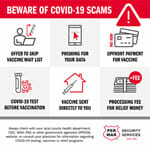Beware of Common COVID-19 Scams
February 8, 2021
COVID-19 has introduced its own brand of fraudulent behavior to businesses and consumers alike. It’s important to know that test kits and vaccine scams are happening right now. Stimulus payments, relief checks and government grant scams are also an up and coming trend for online criminals.
Before we delve into the details, we’d like to be as upfront and transparent as possible.
✔Do NOT interact with unknown or foreign companies.
✔Do NOT engage with unsolicited offers of any kind.
✔Do NOT give out personal or financially sensitive information.
✔Do NOT send money!
Following this simple set of rules can keep you, your employees and your business out of trouble. Please communicate this information with your employees before it’s too late. TL;DR – Click the infographic for an overview.
The Vaccine Wait List Scam
There is a waitlist for the vaccine and it is impossible to skip the line, even with status, cash or credit. How this translates to you or your business is that ANY unsolicited call, email (see sample phishing scam below) or text allowing you to jump ahead should be treated as fraudulent.
The same goes for web pages or ads offering priority access. First in line for the COVID-19 vaccine are health care workers, long-term care facility residents and employees, senior citizens, educators, firefighters, police officers, agricultural works and other essential workers (this can vary by region, check with our local county health officials). Even if you fall into one of those categories, you will not receive any official, legitimate communications offering to skip the line.
Phishing Scams
Phishing is a cybercrime using email, phone or text to lure people into giving away their personal data. They’ll try for your financial information, passwords and anything that identifies you (think social security number). The potential result is identity theft and stolen money. Most scams fall under phishing so please be on the lookout!
PRO TIPS: Always check the sender’s email address (for legitimacy) as that’s usually a dead giveaway and think before you click! Be on the lookout for fishy (phishy) looking pop-ups as well and always verify a site’s security (there should be a locked lock (not an unlocked one) plus the letter “s” in the URL, so https vs. http). It can’t hurt to use antivirus software and firewalls. All of these things will reduce the odds of hackers and phishers getting in.
The Upfront Payment Vaccine Scam
Some scammers will try to get you to pay for the vaccine in advance of your appointment, however, it is free to everyone in the United States (even for those without health insurance). This means you should never pay for the COVID-19 vaccine (in advance or at the time of your appointment) or even submit it to your insurance provider (another fraudulent tactic).
Keep in mind that if your doctor visit entailed other health-related items, you may owe for those but not for the vaccine itself. If you do receive a bill for it, call your provider to speak with them directly.
The ‘You Must Take a COVID-19 Test before You Can Be Vaccinated’ Scam
It is not required to provide evidence of a COVID-19 test or antibody test in order to get the vaccine. Scammers have gotten really creative and will try to convince you otherwise! They’ll call, text or email asking you to purchase their test kit and take their test. Beware of their online ads, too, and do NOT click on them. If you accidentally click on one, don’t give out any information and close the window immediately.
The ‘Let Us Send the Vaccine Directly to You’ Scam
Pharmacies, county health departments, and health care facilities (including any makeshift drive-through clinics) are the are the ONLY places the vaccine is being sent so there is no way to get one sent to you directly. If an ad, email, call or text is promising otherwise, then you know it’s a scam. We repeat, do NOT allow anyone to send the vaccine directly to you as they’ll be the ones getting something (your personal and credit card information), not you.
Check with your local county health department or the CDC’s website for more information.
The ‘We Have Your Relief Money’ Scam
This one is tricky because it has been reported to come from known Facebook contacts (possibly even your bookkeeper because his or her account has been hacked) or a legitimate company. There will be a mention of a COVID-19 relief package, stimulus check or government grant and it’s tempting because those types of things have been circulating for nearly a year now.
What’s more, you are just now finding out about this wonderful news so there’s back pay! But, first, they’ll have to charge you a processing fee. If you haven’t already seen the red flag, now is when alarms should be sounding. Do not ignore them! Abort mission and be glad it didn’t go any further.
The bottom line is that in dealing with COVID-19 testing, vaccines or relief programs, only official public health sources are legitimate. These include the CDC, WHO, FDA and other government agencies, as well as hospitals, pharmacies and other medical or health care facilities. Anything else is a scam!
Always remember the old adage, if it seems too good to be true, it probably is. And, most legitimate companies will not be calling you asking for your credit card or other personal information (that goes for all business, whether it’s COVID related or not). Remember, while we specialize in home and business security, we want you to stay Per Mar protected no matter the crime!
 Careers
Careers Customer Support
Customer Support (800) 473-7627
(800) 473-7627 Contact Us
Contact Us Locations
Locations
